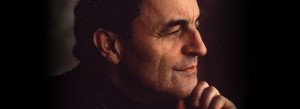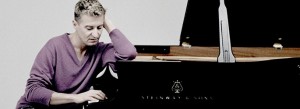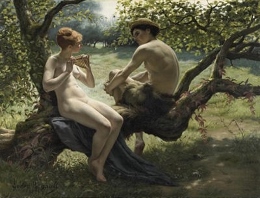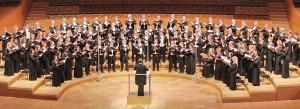REVEL IN RAVEL AND BASK IN BEETHOVEN
I’m so excited about LA Phil’s upcoming program this weekend (March 28 – 30) that I don’t know where to start. Well, actually I do. Ravel’s Daphnis et Chloé.
In 1909, impresario Serge Diaghilev commissioned Ravel to write a score for a new ballet which would be based on the ancient tale—the only known work of the 2nd century AD Greek novelist and romancer Longus. At nearly an hour, the three-part ballet, one of Ravel’s most voluptuous, would become his longest work. Characterized by the quintessentially Ravelian union of vigorous rhythmic diversity, motoric energy, and refined lyricism, this is a more-than-ideal composition to see live at Disney Hall. Ravel spent over two years working on the nymphs and  shepherds ballet, and the reception was surprisingly mixed. There are perhaps two reasons for this: One is that the ballet itself had an unwieldy premiere, and the other is that listeners were still becoming accustomed to this new form of impressionistic music that seemed to be devoid of a beat.
shepherds ballet, and the reception was surprisingly mixed. There are perhaps two reasons for this: One is that the ballet itself had an unwieldy premiere, and the other is that listeners were still becoming accustomed to this new form of impressionistic music that seemed to be devoid of a beat.
Yet Daphnis et Chloé became one of the most enduring hits of the twentieth century, and remains a dazzling experience today. Ravel described his score as “a choreographic symphony” in which his “intention was to compose a vast musical fresco, less scrupulous as to archaism than faithful to the Greece of my dreams, which inclined readily enough to what French artists of the late 18th century have imagined and depicted.” As with a lapidist who cuts, polishes, and engraves precious stones, Ravel created sparklingly brilliant orchestrations, perfectly kaleidoscopic enough to showcase the LA Phil’s principal players: Julien Beaudiment on flute, Ariana Ghez on oboe, Lou Anne Neill on harp, Whitney Crockett on bassoon, and Burt Hara on clarinet.
Soon after the ballet’s premiere, Ravel published two concert suites derived from the original score; far more frequently performed is Suite No. 2, a symphonic fragment taken from the Third Scene of the ballet (consisting of Lever du jour (“Daybreakâ€), Pantomime, and Danse generale). The good news is that the three performances starting Friday will present the complete score.
 Daphnis and Chloé closed the Ballets Russes’ 1912 season, which, if you can wrap your head around this, was on the bill with with Debussy’s Prélude à l’après-midi d’un faune, Weber’s Le Spectre de la rose (orchestrated by Berlioz), and Rimsky-Korsakov’s Schéhérazade (and the 1912 season was sandwiched between Stravinsky’s Petrushka and Le Sacre du printemps). While we sit around wondering what spirit that so currently eludes us infused these mythic creators 100 years ago, the dynamic conductor Charles Dutoit, who already proved his mettle in a definitive 1990 recording with the Montreál Symphony Orchestra and Chorus, will present Daphnis and Chloé utilizing members of the can-do-no-wrong Los Angeles Master Chorale. Presently Artistic Director and Principal Conductor of the London Royal Philharmonic Orchestra, Dutoit recently celebrated his 30-year artistic collaboration with the Philadelphia Orchestra, who in turn bestowed upon him the title of Conductor Laureate.
Daphnis and Chloé closed the Ballets Russes’ 1912 season, which, if you can wrap your head around this, was on the bill with with Debussy’s Prélude à l’après-midi d’un faune, Weber’s Le Spectre de la rose (orchestrated by Berlioz), and Rimsky-Korsakov’s Schéhérazade (and the 1912 season was sandwiched between Stravinsky’s Petrushka and Le Sacre du printemps). While we sit around wondering what spirit that so currently eludes us infused these mythic creators 100 years ago, the dynamic conductor Charles Dutoit, who already proved his mettle in a definitive 1990 recording with the Montreál Symphony Orchestra and Chorus, will present Daphnis and Chloé utilizing members of the can-do-no-wrong Los Angeles Master Chorale. Presently Artistic Director and Principal Conductor of the London Royal Philharmonic Orchestra, Dutoit recently celebrated his 30-year artistic collaboration with the Philadelphia Orchestra, who in turn bestowed upon him the title of Conductor Laureate.
 Not only will you get one of today’s most sought-after conductors, but one of the world’s most popular pianists, Jean-Yves Thibaudet, who will join Dutoit and the LA Phil for Beethoven’s rightfully popular Piano Concerto No. 5, Emperor. Written in 1809, this was the composer’s final concerto and the only one of his piano concertos that he did not play himself due to the progression of his deafness. “It was an emperor of a concerto,†one of Napoleon’s officers stationed in Vienna is said to have exclaimed. Whether or not this is the true origin of the apt sobriquet (which scholars claim was coined by Johann Baptist Cramer, the English publisher of the concerto), Beethoven’s fifth and last piano concerto is a giant of the repertoire, and gives the soloist a lot of space to be assertive. Thibaudet has the rare ability to combine poetic musical sensibilities and dazzling technical prowess. I haven’t heard him play the Fifth, but in other concerts, his unique interpretations always surprise me. His combination of expertise and charisma has placed him in demand globally for more than 30 years (he has recorded more than 50 albums). After Disney Hall, he is off to Europe, but returns in April to play the Shostakovich Piano Concerto No. 1 with L.A.’s own James Conlon and the San Francisco Symphony at Davies Hall.
Not only will you get one of today’s most sought-after conductors, but one of the world’s most popular pianists, Jean-Yves Thibaudet, who will join Dutoit and the LA Phil for Beethoven’s rightfully popular Piano Concerto No. 5, Emperor. Written in 1809, this was the composer’s final concerto and the only one of his piano concertos that he did not play himself due to the progression of his deafness. “It was an emperor of a concerto,†one of Napoleon’s officers stationed in Vienna is said to have exclaimed. Whether or not this is the true origin of the apt sobriquet (which scholars claim was coined by Johann Baptist Cramer, the English publisher of the concerto), Beethoven’s fifth and last piano concerto is a giant of the repertoire, and gives the soloist a lot of space to be assertive. Thibaudet has the rare ability to combine poetic musical sensibilities and dazzling technical prowess. I haven’t heard him play the Fifth, but in other concerts, his unique interpretations always surprise me. His combination of expertise and charisma has placed him in demand globally for more than 30 years (he has recorded more than 50 albums). After Disney Hall, he is off to Europe, but returns in April to play the Shostakovich Piano Concerto No. 1 with L.A.’s own James Conlon and the San Francisco Symphony at Davies Hall.
But we needn’t concern ourselves with “Where in the world is Jean-Yves Thibaudet?†We have him at Disney Hall this weekend. I also recommend the Upbeat Live pre-concert events in BP Hall one hour prior to each concert, (free to all ticket holders). Thomas Neenan, Lecturer in Music History and Music Theory and  California’s Institute of Technology and Director of Music at St. Matthew’s Episcopal Church in Pacific Palisades, hosts.
California’s Institute of Technology and Director of Music at St. Matthew’s Episcopal Church in Pacific Palisades, hosts.
The Friday concert is part of the LA Phil’s “Casual Fridays†series, which is presented without intermission and encourages audience members to attend in comfortable attire. This concert also feature a free TalkBack discussion with musicians held on stage after the performance and a chance to mingle with members of the orchestra in the Concert Hall Café. And if you want to meet Thibaudet, he will be signing CDs after the concert March 29 and March 30.
photos courtesy of LA Phil
top painting: Gaston Renault, Daphnis and Chloe (1881)
middle painting: Louis Hersent, Daphne and Chloe (1817)
Los Angeles Philharmonic
Charles Dutoit, conductor
Jean-Yves Thibaudet, piano
Los Angeles Master Chorale, Music Director Grant Gershon
BEETHOVEN Piano Concerto No. 5, Emperor
RAVEL Daphnis and Chloé
Walt Disney Concert Hall
135 North Grand Avenue
Friday March 28, 2014, at 8 PM
Saturday, March 29, 2014, at 8 PM
Sunday, March 30, 2014, at 2 PM
for tickets, call 323.850.2000 or visit www.LAPhil.com

